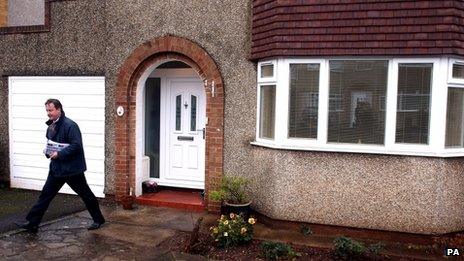PCCs and the democratic deficit
- Published
- comments
Some count centres reported having empty ballot boxes, as Mark Easton reports
And so the inquest begins. Why were the people of England and Wales so emphatically indifferent to being given the power to elect their police and crime commissioners (PCC)?
There will be arguments about the wisdom of holding an election in November, the lack of information, the fact that many details were only available online, concerns about politicisation of the police, the vast constituencies, the shortage of high-profile candidates and on and on.
Those were contributory factors, but I suspect the real flaw was something more fundamental - the voters were never persuaded they needed an elected police and crime commissioner.
The creation of PCCs was the centrepiece of Conservative proposals to reform the police in England and Wales. "Giving people democratic control over policing priorities is a huge step forward in empowering communities," the party manifesto claimed in 2010.
The coalition's Programme for Government retained the idea, arguing for radical reform of the criminal justice system, with directly elected individuals to make the police "much more accountable to the public they serve".
Earlier this year I met Gordon Wasserman, now Lord Wasserman, who was the architect of the Conservative party's PCC policy. A Canadian by birth, it was his experience of US law enforcement, particularly in New York and Philadelphia, which shaped his ideas.
"I want people to see their police commissioner in the street and say 'Hi Commissioner! How are you doing?'" he told me. When I suggested to him that this sounded rather un-British behaviour and that most people wouldn't even recognise their MP or council leader in the street, Lord Wasserman dismissed my scepticism.
However, I had reason to recall our conversation when I was in Lancashire recently, talking to local people about the PCC elections. "It's an American idea," one man told me. "Over there they vote for everything. They even vote for their sewage man. We don't do that here."
There is a perfectly good case to be made for greater accountability of the police.
The old police authorities were, in some cases, less than inspiring - "unaccountable and invisible" as the 2010 Tory manifesto put it.
Recent allegations of police corruption and institutional cover-up help make a case for more scrutiny, and all three major political parties at Westminster have talked about a need for reform of police governance.

David Cameron out leafleting for the PCC elections
One can understand how some policy wonks and politicians became enthusiasts for extending democracy into policing - part of a wider agenda of community empowerment, localism and transparent governance.
But it was a vision that never really escaped the rarefied world of Westminster think tanks. The public were not excited by the language of democratic empowerment - they were much more interested in someone stopping kids creating mischief and local dogs turning pavements into obstacle courses.
With both recorded crime and people's experience of crime and anti-social behaviour at their lowest levels in decades, the issue has slipped down the list of public concerns. Confidence in how the police are doing their job has been rising in recent years - the latest official figures suggest 62% of people agree with the statement "police and local councils are dealing with the crime issues that matter in the local area", up from 57%.
Neighbourhood policing has been a great success in most areas and there seems little evidence of profound frustration that police priorities are seriously awry.
As a consequence, getting the public out to vote for a highly-paid and relatively remote politician, to tackle a democratic deficit they weren't persuaded they had, was always going to be a hard sell.
It wasn't just that the weather was a bit chilly or that the candidates all seemed to be saying the same thing. It was that the electorate had not been convinced there was a need to change the system.
As a man in Lancashire put it to me: "If it ain't broke, why fix it?"